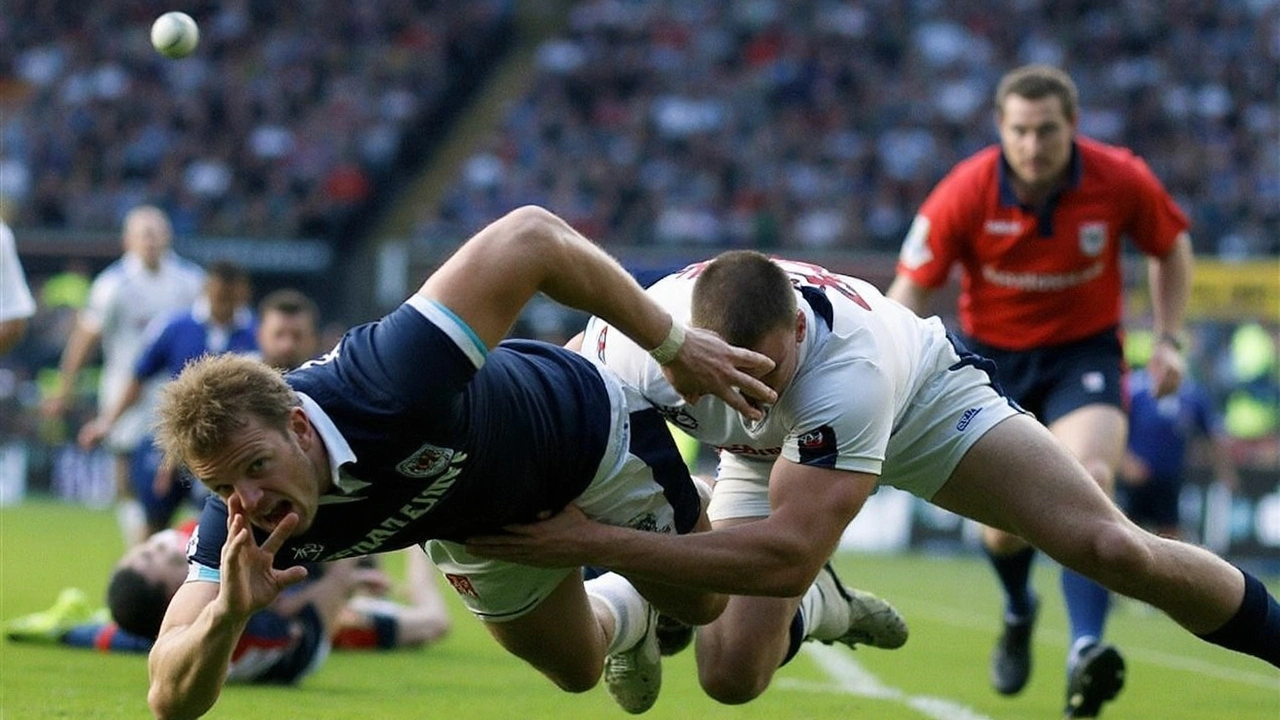A Clash of Titans at Twickenham
In a heart-stopping Six Nations rugby match at Twickenham, England managed to snatch a 16-15 victory over Scotland, marking a dramatic return of the Calcutta Cup to English hands after a four-year absence. The game was fiercely contested, characterized by shifting leads and high stakes that kept fans on the edge of their seats.
Scotland came out strong, initially dominating the field. Their first-half performance was highlighted by impressive tries from Ben White and Huw Jones, putting Scotland ahead with a 10-7 lead at halftime. However, it was the missed conversions by Finn Russell that would later haunt the Scots. Each failed conversion added pressure, hinting at the narrow margin that would eventually define the match's outcome.

England's Steady Response and Key Plays
England's response in the second half showcased their determination and resilience. Marcus Smith and Fin Smith, both pivotal players for England, demonstrated exceptional composure under pressure. Their kicking prowess came through as they successfully landed three crucial penalties, flipping the score to give England a six-point lead. This sharp focus, particularly in the pressure cooker moments, was vital for England's comeback.
The match saw its share of dramatic moments, including a late-game twist when Duhan van der Merwe scored another try for Scotland. This marked his sixth try against England in just three games—a testament to his consistent brilliance. Yet, with the tension at its peak, Russell’s missed conversion of van der Merwe’s try sealed the fate for Scotland, leaving them a single point behind.
The victory crucially keeps England's hopes alive in the Six Nations tournament, although their continued progress depends on the results of other matches, particularly those involving the formidable French team against Ireland. Meanwhile, for Scotland, the defeat marks the end of their championship ambitions, underlining the fine margins that often define sporting glory or despair.
Coaching decisions and player changes added layers to the unfolding drama. England's choice to start Ollie Chessum added fresh energy, while Scotland's strategic introduction of Kyle Rowe and Pierre Schoeman showed an intent to shake things up on the field. Despite these efforts, England's defensive resilience and strategic kicking game held firm.
This match will be remembered not only for its nail-biting finish but also for the lessons it reinforced about the critical nature of every kick, every pass, and every player decision in high-stakes rugby tournaments.







12 Comments
Missing that conversion was a harsh reminder that even the most skilled playmakers can falter under pressure; the thin margins in a Calcutta Cup clash amplify every mistake, and Finn Russell’s slip cost Scotland dearly. The beauty of rugby lies in its cruel balance, where a single kick can rewrite narratives and resurrect old rivalries. England’s composure in the dying minutes showcases the mental fortitude that separates champions from contenders.
Absolutely love how you highlighted the drama – such a nail‑biter! 😊 The tension was unreal and the crowd could feel every heartbeat.
The match unfolded as a textbook case of strategic kicking versus opportunistic running, with each side exploiting different phases of play to assert dominance. Early on, Scotland’s backline demonstrated incisive running lines, exploiting gaps between the English forwards and generating supply for Ben White’s early try. However, the England pack, anchored by the likes of Ollie Chessum, methodically increased the pressure at the breakdown, securing quick ball for their backs. Marcus Smith’s tactical kicking re‑positioned the ball deep into Scottish territory, forcing them onto the back foot and setting the platform for iterative penalty opportunities. The referee’s pattern of awarding penalties for off‑side and high‑tackle infringements subtly tilted possession in England’s favour, a nuance often overlooked in surface recaps. As the second half progressed, the English half‑backs exhibited composure, manipulating the game clock with precision penalties that eroded the Scottish lead incrementally. Each successful penalty not only added three points but also psychologically reinforced England’s belief in a comeback, a phenomenon well documented in high‑stakes tournaments. The turning point crystallised when Duhan van der Merwe’s try reignited Scottish hopes, yet the subsequent conversion attempt by Russell became a moment of collective dread for the Scottish camp. Finn Russell’s miss, while technically a routine kick, was executed under a swirl of adrenaline and fatigue, illustrating how physiological stress can impair even the most practiced motions. England capitalised on this lapse, sealing the result with a disciplined defensive stand that denied Scotland any further scoring opportunities. From a tactical lens, England’s decision to retain a specialist kicker for the final moments underscored the importance of resource allocation in match‑ending scenarios. Moreover, the spatial awareness displayed by the English backs, constantly realigning to exploit mismatches, highlighted the depth of preparation that goes into Six Nations fixtures. The game also reinforced the value of mental resilience; both teams displayed moments of brilliance, yet England’s capacity to stay composed under mounting pressure proved decisive. In retrospect, the match serves as a vivid illustration of how granular elements-kick accuracy, scrum dominance, and strategic time‑management-coalesce to shape outcomes in elite rugby. Ultimately, the Calcutta Cup’s return to England was not merely a product of scoring more points, but a testament to meticulous execution across every facet of the sport.
While the excitement of a close match is undeniable, it is worth reflecting on the responsibility players bear as role models; a missed kick may seem trivial, yet it sends a message about preparation and focus to aspiring youngsters watching at home.
It’s heartbreaking for Scotland to lose by a single point, especially after such a valiant effort and those missed conversions that could have changed everything 😊. Nonetheless, England’s steady composure under pressure showcases the depth of their squad and the importance of mental toughness in the final minutes.
England kept cool and took the penalties they needed; it was a solid game plan and they stuck to it till the end.
What a fascinating display of strategic depth, isn’t it?; the way England leveraged penalty opportunities, while simultaneously applying pressure at the breakdown, really underscores the layered nature of modern rugby, and one can’t help but wonder how much of that was pre‑planned versus opportunistic, especially given the timing of Finn Russell’s miss-could a different substitution have altered the psychological momentum, or was the outcome inevitable after the first half?
Every kick tells a story of a team’s resolve.
England’s triumph reaffirms our superiority in the Six Nations; the relentless forward pressure and precision kicking epitomise the rugged, uncompromising style that defines British rugby heritage.
The post glosses over the systemic issues that led to Scotland’s collapse; their defensive structures were porous, and the coaching staff’s half‑hearted adjustments did nothing to stem the English onslaught, highlighting a deeper lack of strategic foresight.
Twickenham’s atmosphere was electric, the fans living each moment as the game swung back and forth; England’s calm under fire was impressive.
Great effort by both sides, scotland gave it their all but england kept their head in the game, well done lads!